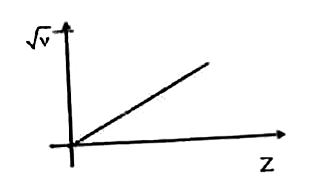Which one is the fundamental property of an element-atomic number or mass number?
To determine which property is fundamental for an element between atomic number and mass number, we need to analyze both terms and their significance.
1. Define Atomic Number:
The atomic number (Z) of an element is defined as the number of protons present in the nucleus of an atom of that element.
Hint: Remember that the atomic number uniquely identifies an element.
2. Define Mass Number:
The mass number (A) is the total number of protons and neutrons in the nucleus of an atom. It can be expressed as:
Mass Number(A)=Number of Protons+Number of Neutrons
Hint: Mass number accounts for both protons and neutrons, while atomic number only counts protons.
3. Uniqueness of Atomic Number:
Each element has a unique atomic number. For example, hydrogen has an atomic number of 1 (1 proton), helium has an atomic number of 2 (2 protons), and so on. No two elements can have the same atomic number.
Hint: Think about how the periodic table is organized based on atomic numbers.
4. Variability of Mass Number:
Different isotopes of the same element can have different mass numbers because they have the same number of protons but a different number of neutrons. For instance, carbon has a mass number of 12 (6 protons and 6 neutrons) and an isotope of carbon, carbon-14, has a mass number of 14 (6 protons and 8 neutrons).
Hint: Isotopes are key to understanding why mass number is not unique to an element.
5. Conclusion:
Since the atomic number is unique to each element and remains constant for all atoms of that element, it is considered the fundamental property of an element. In contrast, the mass number can vary among isotopes of the same element, making it less fundamental.
Final Answer: The fundamental property of an element is the atomic number.
The atomic number (Z) of an element is defined as the number of protons present in the nucleus of an atom of that element.
The mass number (A) is the total number of protons and neutrons in the nucleus of an atom. It can be expressed as:
Mass Number(A)=Number of Protons+Number of Neutrons
Each element has a unique atomic number. For example, hydrogen has an atomic number of 1 (1 proton), helium has an atomic number of 2 (2 protons), and so on. No two elements can have the same atomic number.
Different isotopes of the same element can have different mass numbers because they have the same number of protons but a different number of neutrons. For instance, carbon has a mass number of 12 (6 protons and 6 neutrons) and an isotope of carbon, carbon-14, has a mass number of 14 (6 protons and 8 neutrons).
Since the atomic number is unique to each element and remains constant for all atoms of that element, it is considered the fundamental property of an element. In contrast, the mass number can vary among isotopes of the same element, making it less fundamental.
Topper's Solved these Questions
- BOOK - ICSECHAPTER - PERIODIC PROPERTIES OF ELEMENTS EXERCISE - ILLUSTRATIVE ASSIGNMENTS32videos
PERIODIC PROPERTIES OF ELEMENTS
- BOOK - ICSECHAPTER - PERIODIC PROPERTIES OF ELEMENTS EXERCISE - QUESTIONS FOR PRACTICE ( Fill in the blanks by using correct word/term given in the brackets and rewrite the complete sentence in your notebook.)23videos
PERIODIC PROPERTIES OF ELEMENTS
- BOOK - ICSECHAPTER - PERIODIC PROPERTIES OF ELEMENTS EXERCISE - IMPORTANT ASSIGNMENTS18videos
PERIODIC PROPERTIES OF ELEMENTS
- BOOK - ICSECHAPTER - PERIODIC PROPERTIES AND VARIATIONS OF PROPERTIES (PHYSICAL AND CHEMICAL) EXERCISE - Questions from Previous ICSE Board Papers (2018)5videos
PERIODIC PROPERTIES AND VARIATIONS OF PROPERTIES (PHYSICAL AND CHEMICAL)
- BOOK - ICSECHAPTER - PERIODIC PROPERTIES AND VARIATIONS OF PROPERTIESEXERCISE - ASSERTION AND REASON BASED QUESTIONS5videos
PERIODIC PROPERTIES AND VARIATIONS OF PROPERTIES
Similar Questions
Knowledge Check
- Question 1 - Select One
Assertion:Atomic number is a more fundamental property of an element than its atomic mass.
Reason:Atomic number is equal to number of protons in an atom.AIf both assertion and reason is the correct explanation of assertion.BIf both assertion and reason is the correct explanation of assertion.CIf both assertion and reason is the correct explanation of assertion.DIf both assertion and reason is the correct explanation of assertion. - Question 2 - Select One
Atomic number is the fundamental property of an element'. Write the name of the scientist who proved it by an X-ray experiment.
Aa)BohrBb)NewlandsCc)MendeleevDd)Moseley
Who classified the elements on the basis of fundamental properties of elements like atomic mass?
View SolutionWho proposed that atomic number is the fundamental property of an element?
View SolutionWhich of the following are true for an element ?
(i) Atomic number = number of protons + number of electrons
(ii) Mass number = number of protons + number of neutrons
(iii) Atomic number = number of protons = number of neutrons
(iv) Atomic number = number of protons = number of electronsView Solution.. .......... and not the ......... is the most fundamental property of an element.
View SolutionDefine atomic number and mass number of an atom.
View Solution
Moseley said that the frequency of X-ray of an element increases with a regular increase in a fundamental property of elements. Name this fundamental property..View Solution

